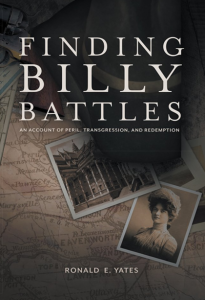
Battles is born on the Kansas frontier in 1860 and while still young moves with his mother (his father having died in the Civil War) to Lawrence, Kansas where he has a mostly normal childhood. While a student at what would eventually become the University of Kansas, Battles’ life takes a seemingly auspicious turn that ends up drawing him into dangerous and disturbing adventures that shape the rest of his life. Battles has a veritable talent for walking into trouble and spends much of this first book of a planned trilogy in unsuccessful attempts to live a quiet life. Occasionally poor decisions lead to Battles’ problems, but more often, young Billy just seems to be in the wrong place at the wrong time. As the country grows and the frontier is settled, Battles also grows and attempts to settle, but unfortunately his troubled past continues to cause him trouble.
As you might expect, there is plenty of Old West atmosphere here, but the book transcends the Western genre. Despite an abundance of gunfights and rough characters, Finding Billy Battles is more the story of a man dealing with the situations life throws at him than a story of life in the old West. Yates does, however, include a great deal of period detail—far more than most such books offer—including things you might not have thought of, such as details of train travel in the late 1800s and the gradual increase in modern conveniences, such as electric lights and indoor bathrooms.
Real historical characters, both well-known and otherwise, make appearances, including Bat Masterson, Wyatt Earp, Doc Holliday, and Oscar Wilde. (Be assured, Oscar Wilde does not appear at the O. K. Corral.)
The book is a little repetitive in places, and there is a great deal of frontier and Western slang, so much in fact that it becomes tiring and a bit distracting. Some variation on the phrase “go heeled” (which I learned only by reading this book means to carry a weapon) turns up dozens of times. Other phrases—”slyboots,” “blowpipe,” “sockdologer,” which at first are kind of neat, begin to seem forced when they are used page after page by almost all the characters. Having so many different characters using these terms weakens the characterization, which is otherwise excellent. I hope Yates will get this out of his system before the next installment. However, I must admit that my life is richer for having learned the word “snollygoster.” One other small complaint: While the book is otherwise nicely formatted, the version I read (for Kindle) doesn’t have paragraph breaks when the dialog shifts from one speaker to another. This often caused me to lose track of who was doing the talking, an especially frustrating problem in such an engaging book.
Despite these minor quibbles, I recommend this book to anyone who enjoys adventure tales, western or otherwise. Finding Billy Battles is well written and edited, nicely paced, with a believable main character readers will come to care about. The ending sets up the next installment nicely, without leaving you feeling as if you’ve been cheated of an ending.
Links
Amazon
Buy in the SPR Book Store (Western)
Barnes & Noble
Review Overview
Design
Editing
Content
Get an Editorial Review | Get Amazon Sales & Reviews | Get Edited | Get Beta Readers | Enter the SPR Book Awards | Other Marketing Services






















Leave A Comment